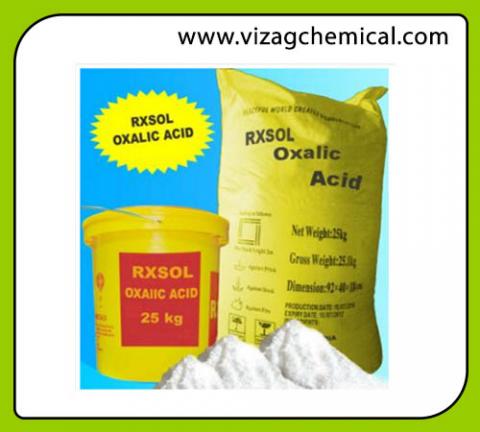Primary tabs

Oxalic Acid
Oxalic acid is an organic compound with the formula H2C2O4. This colorless crystalline solid is a dicarboxylic acid. In terms of acid strength, it is about 3,000 times stronger than acetic acid.
Oxalic acid is a reducing agent and its conjugate base, known as oxalate (C2O42), is a chelating agent for metal cations. Typically oxalic acid occurs as the dihydrate with the formula H2C2O4·2H2O.
Transparant, colourless crystals. Hazard: Toxic by inhalation and ingestion, strong irritant.
Uses: general metal and equipment cleaning, purifying agent and intermediate for many compounds.
Oxalic acid's main applications include cleaning or bleaching, Especially for the removal of rust (iron complexing agent), e.g. Bar Keepers Friend is an example of a household cleaner containing oxalic acid.
About 25% of produced oxalic acid is used as a mordant in dyeing processes.
It is used in bleaches, especially for pulpwood.
It is also used in baking powder.
Solubility in water 14.3 g/100ml (25 °C)
Solubility 23.7 g/100ml (15 °C) in ethanol
--------------------------------------------------------------------------------
1.4 g/100ml (15 °C) in diethyl ether
Acidity (pKa) 1.25, 4.14
Density 1.90 g cm-3 (anhydrous) or 1.653g cm-3 (dihydrate)
Using Application :
Oxalic Acid is used extensively for boat cleaning, it can be used on timber, GRP and steel craft for the removal of rust and waterline stains and also to clean timber decks. For vertical applications oxalic can be mixed with wallpaper paste to make a thick solution, this mix will cling to any vertical surface and can be washed off with water.
REMOVAL OF IRON STAINS
Iron stains can be removed by scrubbing the stained area with an aqueous solution of oxalic acid in water. Dissolve 1kg oxalic acid to 6Lt of warm water. Scrub stained area using a stiff-bristle brush. Thoroughly rinse with water after treatment. When completely dry, lightly sand the surface. Surface must be clean and completely dry (not just surface dry) before refinishing. Incomplete drying and retained subsurface moisture can cause finish adhesion failure.
Many of Construction Chemicals customers are involved with building renovation and in particular Oak frames, oak windows and beams as well as flooring. Our product range ensures that whenever timber is being used we have the products to bond, fill, preserve, sand, stain and paint. Our Customers will be aware of the problems of oak stains especially with green oak. This can look unsightly and spoil good looking beams or floors. OXALIC ACID CLEANS MOST STAINS FROM TIMBER.
REMOVAL OF BLACK WATER AND TANNIN STAIN
A common form of staining on wood surfaces results from contamination with iron. A portion of the extractives in wood includes a group of chemicals collectively called tannins. The amount of tannins depends on species; oak, redwood, and cedar are rich in tannins. Tannins react with iron to form a blue-black stain on wood. Common causes of iron stain include use of un-galvanized or poorly galvanized fasteners; OXALIC ACID brushed into the stains makes removal easy. Finishing wood with a WATER REPELLANT WITHA PRESERVATIVE AND/OR WOOD POLISH OR OIL greatly minimizes further iron stain and enhances the finish of the wood.. Wood must be clean; free of paint, waxes, oils and dirt. Use wood cleaners to remove any grease oils or grime. Use paint strippers to remove any finish, paint or coating.
|
COOH.2H2O |
OXALIC ACID |
| Molecular Formula | Mol Wt. 126 |
| APPEARANCE |
Fine colourless & Odourless prismatic crystals. (It has appearance of powder form.) |
| CHEMICAL COMPOSITION | |
| OXALIC ACID CONTENT % BY MASS | MIN 99.00% |
| SULPHETED ASH % BY MASS | MAX 0.15% |
| CHLORIDE (as CI) % BY MASS | MAX. 0.005% |
| SULPHETES (as SO4) % BY MASS | MAX 0.10% |
| IRON (as Fe) % BY MASS | MAX 0.05% |
| HEAVY DUTY METALS (as Pb) |
MAX 0.005% |
| SOLUBILITY | Soluble in water, water solution is clear & colourless. |
In humans, oxalic acid has an oral (lowest published lethal dose) of 600 mg/kg (human).
The main toxicity of oxalic acid is due to the precipitation of calcium oxalate in the kidneys when urine becomes supersaturated with respect to this salt. Oxalic acid is also a metabolism product of the degradation of ethylene glycol if accidentally ingested and, as such, directly represents a danger for the kidneys in case of glycol poisoning.
First Aid
IF SWALLOWED -Give 1 or 2 glasses of water and call for medical assistance immediately.
EYE CONTACT - Wash with plenty of water for at least 15 minutes; Get medical attention promptly.
